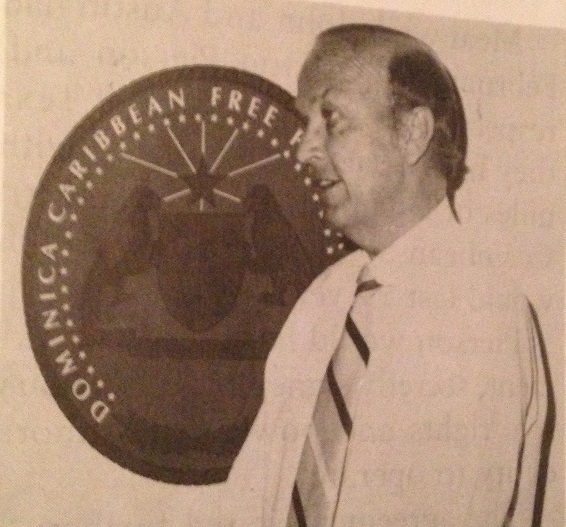|
|
History Revisited: John’s audacious plan to give away one sixth of Dominica
By Thomson Fontaine
February 6, 2015 2:00 A.M

Don Pierson Chairman of Dominica Caribbean Corporation briefs the Dominica public in April 1978. |
Roseau, Dominica (TDN) On November 3, 1978 the world’s attention was focused on the island of Dominica the latest country in the British crown to assume its independence. Fireworks, pomp and ceremony highlighted the event locally. Sitting proudly at the epi center of this momentous event was the country’s first prime minister 40 year old Patrick Roland John.
John was riding a wave of popularity having handsomely won the 1975 general elections. This was his crowning achievement taking Dominica from associated statehood to a proud independent country of some 77 000 inhabitants.
International press coverage focused heavily on the country’s size and seeming lack of resources. One newspaper in Dallas Texas described it as follows: “a true banana republic (the fruit accounts for 70 percent of the country’s meagre exports), it contains little else.
“There is no tourist trade. A recent visitor had to stuff a towel in a broken window to keep out the rain. The Gross Domestic Product is about US $37 million a year the sum generated by the United States each six minutes.”
In Arlington, Texas the news coverage caught the attention of a 26 year old attorney Grey Pierson. “We figured they needed help,” he later remarked to the press. Within days he had made his way to Dominica to meet with the erstwhile leader. Once there he told John that he could help develop the country’s economic potential. Convinced, and desperate to offer hope to thousands of his followers, John agreed.
Grey Pierson was no ordinary Texan. He was the son of millionaire businessman Don Pierson who had shot to international fame after he stationed a boat off the Coast of England in the 1960s and beamed pirate radio broadcasts into British homes. The British government would eventually shut down the operation.
Undaunted by this setback in England, Don Pierson courted the attention of Haiti’s dictator Francois Baby Doc Duvalier. In 1971 Duvalier entered into a 99-year contract with his company Dupont Caribbean Inc. to set up a Free Port in that country. It would lead to the establishment of Free Port Tortuga.
Pierson would later claim that within 18 months he succeeded in building the island's first airport, a loading dock for seagoing vessels, rudimentary water and sewer system, an electricity generating facility, and six miles of paved road. However within three years the project came to an abrupt end when it was claimed that Duvalier, without warning, took over the company.
Back in Arlington, Pierson immediately set up the Southern Caribbean Corporation (CSC) naming himself President and his father Don Pierson as Chairman. With the corporation duly registered in Texas on December 27, 1978, the Piersons’ returned to Dominica in early February to hammer out an agreement with the John administration.
Taking the lead in Dominica along with John was the influential Attorney General and Foreign Minister Leo Austin and Deputy Leader of the ruling party education minister Henkel Christian.
On February 9, 1978 the agreement was secretly signed by the three ministers on behalf of the government of Dominica while Don Pierson signed on behalf of his corporation.
Within days word spread about the details of the agreement. A stunned populace could scarcely believe news reports of the contents of the agreement. To begin, 45 square miles to the North of the island consisting of the country’s most fertile agriculture land, the entire town of Portsmouth, and the lone airport would be leased to the CSC for 99 years at a cost of $100.
More than one sixth of the entire area of the country comprising about one third of the population would be in an exclusive Free Port Zone under the direct control of the CSC. The agreement granted CSC ‘extraordinary and exclusive rights and powers to authorise any person, corporation or business entity to operate within the zone.’
At the same time “all profits derived from the Free Port would be administered, held and distributed/controlled by the CSC.”
It also allowed for the setting up of The Dominica Caribbean Free Port Authority (DCFPA) with ‘responsibility for security within the Free Port Area.’ Under the agreement the government would continue to be responsible for immigration duties within the Zone, but that would be ‘subject to the veto power of the DCFPA.’
Another provision of the agreement gave the government of Dominica 100 000 non- voting shares valued at $100 000. At the same time Don Pierson and his son would receive an equal number of voting right shares. In addition, all disputes arising from the agreement would bypass the local judiciary and be submitted to the international Center for Settlement of Investment Disputes.
Opposition to the proposed Free Port was swift and unrelenting. The official opposition freedom party, the Farmers Union, civic and church groups all added their voices to the growing chorus of discontent. Land owners in the designated area openly opined that they would under no circumstance give up their lands to be leased by the CSC.
Continue Reading

|
|
|
